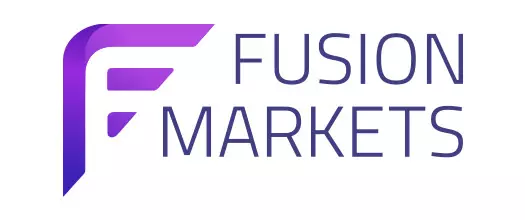The rise of digital currencies has transformed the global financial sector, prompting many forex brokers to integrate cryptocurrency payment options. Traders, whether beginners or seasoned professionals, can now benefit from the flexibility of funding their accounts with popular cryptocurrencies.
Bitcoin remains the most widely accepted option, but other established cryptocurrencies like Ethereum and USDT are also commonly supported, making them accessible choices for UK traders. In this guide, we highlight reliable UK-friendly brokers that support crypto deposits and withdrawals.
 Fusion Markets
Fusion Markets Global Prime
Global Prime BlackBull Markets
BlackBull Markets FP Markets
FP MarketsBelow, you can find more information about the best trading platforms in the UK that accept crypto:
- A CFD broker known for its narrow spreads and a low commission of $2.25 per side, Fusion Markets facilitates instant deposits through two crypto-based payment solutions. The first requires UK clients to use their own crypto wallet and is also available for withdrawals. Supported coins include BTC, BCH, LTC, ETH (ERC20), USDT (ERC20) and XRP. Traders may also fund their accounts via Binance Pay.
- Global Prime is a versatile broker that allows UK clients to trade forex, crypto, indices, commodities and bonds. Traders can transfer funds via debit or credit cards, digital wallets, bank transfers and crypto-based methods. Both deposits and withdrawals are instant, and they can choose from BTC, BCH, LTC, ETH (ERC20), USDT (ERC20) and XRP. Each transaction type is fee-free.
- A UK-registered brand (No. 09556804), Blackbull Markets is suitable for forex traders who wish to use crypto for payments. The broker charges no fees on deposits. Deposits are instant for BTC, ETH, USDT, USDC, XRP, LTC, LINK, BCH and XLM. Crypto withdrawals cost $5 and are processed in 1-2 days.
- FP Markets opened its virtual doors in 2005 and has since remained a reliable broker for UK traders interested in forex, stocks, digital currencies and more. Clients can choose from a range of deposit options, including digital currencies. Crypto top-ups are processed within an hour, and the same coins can also be used for withdrawals.
For many trading enthusiasts, cryptocurrencies provide swift transactions, enhanced privacy, and greater convenience compared with traditional banking. Depositing with crypto is straightforward: choose a coin and fund the account once your profile is verified.
Most platforms do not add fees for crypto transactions, although network fees may apply. If you would like to learn more about what it means to deposit and cash out via crypto as a forex trader, we encourage you to continue reading.
| Broker | ||
|---|---|---|
| Fusion Markets | £0N/A | £0N/A |
| Global Prime | £0N/A | £0N/A |
| BlackBull Markets | £0N/A | £0N/A |
| FP Markets | £50N/A | £50N/A |
Are Cryptocurrencies Popular with UK Forex Traders?
Cryptocurrency adoption in the UK has grown significantly, with recent research data from the Financial Conduct Authority (FCA) showing that in 2024, crypto ownership rates hit 12% among adults. This translates to roughly 7 million individuals and represents a two-percentage-point increase from the previous 10%.
In the same year, awareness reached 93% of the population, and average holdings rose to £1,842. The FCA notes that many first-time buyers act on recommendations from friends and family.
This popularity has resulted in a growing interest in crypto among UK-based forex enthusiasts. As a result, an increasing number of brokers that welcome UK traders have begun supporting cryptocurrencies for transactions.
Not all trading platforms accept cryptocurrencies for deposits or withdrawals, however. Many, particularly those licensed by the FCA, still prefer sticking to traditional banking options. As a result, UK traders may need to use offshore brokers to fund accounts with crypto.
How to Use Crypto for Payments at UK Forex Brokers?
Using crypto to fund and withdraw funds from a forex account is simple and secure. To top up your account, you will typically need to follow the steps outlined below:
- The initial step involves selecting a broker and completing the registration and verification process.
- Then, an active trading account must be created, which will enable the user to access the deposit page.
- There, they can choose their preferred digital currency payment method, which will prompt the broker to generate a unique wallet address.
- The final step is to transfer funds from the trader’s personal crypto wallet to the provided address.
Withdrawing funds works in the same way: a trader visits the withdrawal section, selects the same crypto method used for the deposit, and provides their wallet address for the funds to be transferred. This process is generally designed to be quick and user-friendly.
One of the principal benefits of using cryptocurrencies for these transactions is speed. Deposits are typically instant or completed within a few hours.
Most forex brokers that cater to UK clients do not impose fees on deposits, although network fees, which can be adjusted for faster processing, still apply. The situation is a bit different when it comes to withdrawals, as certain trading platforms decide to charge their clients for cash-outs.
A key consideration for traders is the potential for stricter Return to Source (RTS) policies, which some regulated brokers enforce. This policy mandates that withdrawals up to the amount of the original deposit must be returned to the same crypto wallet.
Profits above the deposit may be paid via another method, such as a bank transfer. For traders using Bitcoin, it is essential to have a crypto wallet ready beforehand and to double-check all addresses and information during both the deposit and withdrawal processes to ensure the security and accuracy of the transaction.
Mandatory KYC Procedures for Crypto Users at UK Forex Brokers
Forex brokers dealing with cryptocurrency transactions within the United Kingdom, Australia and other regions with strictly regulated financial sectors must implement rigorous Know Your Customer (KYC) protocols as part of their regulatory obligations. These verification procedures serve multiple critical functions in the financial ecosystem, primarily focusing on establishing client identities and preventing unlawful activities.
By collecting and verifying personal documentation, brokers fulfil compliance requirements set forth by governing bodies while simultaneously creating barriers against fraud-related crimes. The KYC framework represents a fundamental security measure that protects both service providers and their clients.
The verification process demands submission of specific documents that establish both identity and residential address. Acceptable identification typically includes:
- Government-issued credentials: passports, driving licences
- Proof of residence: credit card statement, utility bill, bank statement
Users can usually send either photocopies or photos of their documentation. Do keep in mind that financial service providers generally impose strict standards regarding document quality and validity periods, rejecting materials that appear altered or fail to meet specified criteria.
Crucially, these verification steps must be completed before clients can access live trading functionalities or process cryptocurrency deposits. Withdrawal procedures also maintain strict alignment with initial funding methods, reinforcing anti-money-laundering safeguards through consistent transaction pathways. This comprehensive approach to client verification underscores the financial sector’s commitment to maintaining integrity while facilitating legitimate digital asset transactions.
Advantages and Disadvantages of Using Crypto at Online Brokers
The increasing integration of cryptocurrencies as a payment method in online brokerage services has offered a new way for traders to manage their funds. Digital currencies like Bitcoin and Ethereum are becoming more commonplace across the UK, providing an alternative to conventional fiat options.
While this development brings several perks, traders should also be aware of the potential drawbacks. Below, we explore the key advantages and disadvantages of using crypto for deposits and withdrawals at online brokers:
Advantages:
- Rapid Transactions: Funds can be deposited or withdrawn within minutes to a few hours, which is often significantly quicker than certain traditional methods such as bank transfers.
- Enhanced Security: The decentralised architecture of cryptocurrency transactions is considered highly secure thanks to its complex back-end processes, which many users find more reliable than traditional banking.
- Cost-Efficient: Most brokers do not levy additional charges for using digital currencies. While blockchain network fees apply, they are typically low and can be adjusted according to the desired transaction speed.
- Convenience: Cryptocurrencies are usually available for both deposits and withdrawals, providing a seamless experience for managing a trading account.
- Accessibility: With more global brokers supporting popular digital assets such as Bitcoin, Tether and Ethereum, finding a suitable platform that accepts crypto is becoming increasingly easy.
Disadvantages:
- Irreversible Payments: The lack of a chargeback option is a significant risk. If funds are mistakenly sent to the wrong wallet address, they cannot be recovered.
- Limited Availability in the UK: Cryptocurrency payments are not as widely accepted as conventional methods such as credit cards or bank transfers, particularly among FCA licensees. Consequently, UK-based forex traders may need to use offshore platforms.
- Wallet Requirement: Traders must set up and manage a personal digital wallet to facilitate transactions to and from their brokerage account.
- No Universal Fee Policy: Although most brokers do not charge fees, this is not universal. Transaction fees and limits can vary greatly between different platforms, so it is important to check the terms beforehand.
How to Pick a Reliable Crypto Deposit Broker in the UK?
Selecting a trustworthy cryptocurrency deposit broker in the UK involves assessing several critical factors. A well-regulated brand, for instance, ensures security and compliance with rigorous financial standards, while competitive fees, diverse account options and strong customer support contribute to a seamless trading experience.
A broker’s regulatory status is paramount for ensuring a safe trading environment. As established, finding an FCA-authorised broker that accepts crypto for transactions may prove challenging, but traders should still stick to regulated brokers.
Brands with licences from the Australian Securities and Investments Commission (ASIC), for instance, must adhere to similar regulatory standards and are generally considered reputable. Examples of other trusted financial supervisors include CySEC (Cyprus) and Germany’s BaFin. Some brokers may also hold licences from offshore regulators like the FSA (Seychelles) and the VFSC (Vanuatu), though these may offer fewer protections.
Always verify the broker’s regulatory status through official databases to confirm the legitimacy of its licence. For example, you can visit ASIC’s register here. Make sure to check for any past disciplinary actions as well.
Below, you can learn more about the other key aspects you should consider when choosing a brokerage:
- Market Variety: A reliable broker should offer a diverse selection of financial instruments. If you plan on trading forex, for instance, majors (GBP/USD, EUR/USD), minors (GBP/JPY, EUR/GBP) and exotics (GBP/PLN, AUD/SEK) should all be included in a brand’s catalogue of currency pairs. In terms of crypto trading, a suitable broker may offer Bitcoin, Ethereum, Litecoin and other notable coins. The presence of commodities, shares, ETFs and indices will also ensure a diverse selection of products to pick from.
- Account Types (Cost Structure): Ideally, a broker will offer both zero-commission accounts, where the costs are incorporated into the spread, and commission-based accounts that feature significantly lower spreads.
- Demo and Professional Accounts: Demo accounts are essential for beginners as they enable paper trading, which allows users to trade risk-free while learning the ropes. The presence of professional accounts, meanwhile, benefits those with extensive trading experience.
- Platforms: The trading platform of your chosen brokerage should be user-friendly and equipped with essential tools. Leading brokers typically support MetaTrader 4 (MT4), MetaTrader 5 (MT5), TradingView or cTrader and provide advanced charting, automated trading and risk-management features.
- Deposit and Withdrawal Fees: High deposit and withdrawal fees can significantly impact profitability. Look for brokers that are transparent about their cost structure and impose minimal or no fees on crypto transactions.
- Customer Support: Reputable brokers have support teams ready to assist traders 24/7 via live chat, email or phone. At the very least, customer support should be available 24/5.
- Reputation: A broker’s reputation can be gauged through Trustpilot scores and online reviews. Consistently positive assessments indicate reliability, while recurring complaints about withdrawals or poor service should raise red flags. Additionally, take note of how the broker’s team responds to both positive and negative feedback.
Crypto Deposit Alternatives Suitable for UK Forex Traders
UK forex traders who are looking for alternatives to cryptocurrencies for their transactions have multiple secure and efficient payment options to pick from. Among the most widely used methods are credit/debit cards, such as Visa and Mastercard. They are popular for their instant deposits and broad acceptance among brokers, especially brands that hold an FCA licence.
Bank transfers are another option. They are characterised by their security, though processing times may be slower.
For faster transactions, digital wallets like PayPal and Neteller offer convenience and strong buyer protection. The latter is also favoured for its low fees and multi-currency support.
Traders should compare these options based on processing speeds, costs and broker-specific policies to choose the best method for their needs. However, the ideal payment solution ultimately depends on personal priorities. By evaluating the aforementioned factors, along with one’s specific preferences, a UK trader can easily optimise their deposit and withdrawal experience in the forex market.
In the following table, we offer an overview of the key aspects of crypto transactions and how this payment solution compares with our selection of alternatives:
| Feature/Aspect | Crypto | Bank Transfers | Credit/Debit Cards | Neteller | PayPal |
|---|---|---|---|---|---|
| Transaction Speed | Instant or up to an hour/several hours | 1-5 business days | Instant | Instant | Instant |
| Fees | Network fees (vary based on the cryptocurrency, processing speed, blockchain and network traffic) | High fees for international transfers | Varies by bank; may include foreign transaction fees | Moderate fees for deposits/withdrawals | Moderate fees for withdrawals and currency conversion |
| Security | High (encryption) | High (bank-level security) | High (fraud protection) | High (2FA, encryption) | High (buyer protection) |
| Acceptance | Accepted by a range of UK-friendly brokers | Widely accepted | Widely accepted | Accepted by some UK brokers | Accepted by many UK brokers |
| Withdrawal Speed | Instant or up to an hour/several hours | 1-5 business days | Between 1-3 business days | Instant to 1 business day | Instant to 1 business day |
| Deposit Speed | Instant or up to an hour/several hours | 1-5 business days | Instant | Instant | Instant |
| Chargeback Availability | No | No | Yes | No | Yes |
| Multi-Currency Support | Yes | Yes | Yes | Yes | Yes |
FAQ
Can I use cryptocurrencies for both deposits and withdrawals at forex brokers?
Many UK-friendly brokers now accept cryptocurrencies like Bitcoin, Ethereum and USDT for deposits and withdrawals. However, policies vary, as some platforms allow crypto transactions exclusively for deposits, while others support both top-ups and withdrawals. Always review the broker’s payment terms to be sure. Additionally, confirm that the broker supports the specific cryptocurrency you intend to use.
Are crypto transactions instant?
Crypto deposits are usually processed faster than traditional bank transfers, often instantly or within an hour, depending on network congestion. Withdrawals may take longer, sometimes up to a couple of hours. You may need to check your chosen trading platform’s FAQ or contact its support team for the estimated timeframes, as they can vary from broker to broker.
What are the risks of using crypto for trading account funding?
Cryptocurrency transactions are irreversible, meaning accidental transfers cannot be refunded. Additionally, crypto prices are volatile, and deposits made during price swings may affect your account balance. Security vulnerabilities, such as hacking or phishing scams, also exist. To mitigate risks, use brokers with strong security protocols (like cold storage for crypto holdings) and enable two-factor authentication (2FA) on both your trading and crypto wallet accounts.
Do brokers charge fees for crypto deposits/withdrawals?
This depends on the broker. Most do not attach fees to crypto transactions, while others may keep deposits fee-free but charge clients for cashing out. Note that even if you use a trading brand with no transaction fees, you will still need to take network fees into account.
Can I fund my forex accounts with crypto while trading on the go?
Yes, most modern trading platforms support crypto deposits (and withdrawals) via their respective mobile apps. Whether you use an iPhone, Android device or tablet, you can easily fund your account or cash out profits in cryptocurrencies like Bitcoin, Ethereum or USDT.